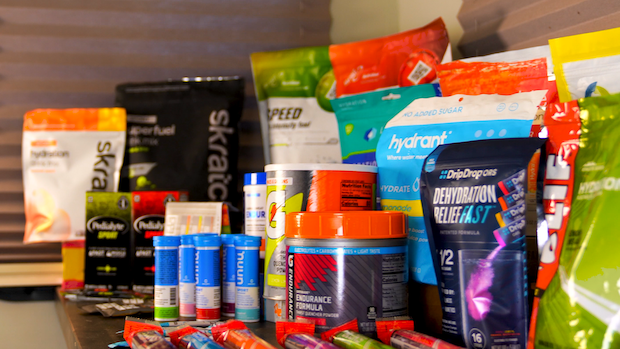Should You Use a High-Carb Fueling Plan All the Time?

Recent papers have displayed quite clearly that non-elite athletes can tolerate 120 grams of carbs per hour. Even older research has indicated that it might take consuming up to 140 or 150 grams of carbs per hour to absolutely maximize exogenous carb oxidation, during exercise. (Biochem refresher: exogenous means “from outside the body,” and oxidation means “burned to fuel the work done.”) There are countless anecdotes of pro athletes and regular folks consuming and benefiting from>100 grams of carb intake per hour during events lasting longer than 3 hours, and especially for events longer than 4 or 5 hours.
Does that mean you should target 100 grams of carbs per hour for every training session from now on?
For elites, probably not.
For high-level amateurs, also probably not.
For more “regular” amateurs like myself, absolutely not. Why not? Good question. Here's a few reasons.
It's Unnecessary
It doesn’t take 100 grams of carbs during a 60 minute recovery ride to get through the ride. Likewise, you don’t need two gels to get through a 30 minute aerobic run. For shorter and easier sessions, if you’re fueling with carbohydrates through normal consumption before training, high carb intakes during training are simply overkill.
Gut Training Doesn't Take That Long
In case you missed it, “gut training” means training your gut to handle more carbs without upset. It does work, but it’s probably more popular than it is useful. It’s usually done before a race.
You might be seeking improved gut tolerance of carb intake for an upcoming race. Interestingly, gut training doesn’t take years to complete. You can probably reap most of the benefits of gut training in under 6 weeks. Maybe much less than that. It appears from research that there could be substantial adaptations within two weeks. So, if you’re considering using higher carbs to train your gut, keep in mind that it doesn’t need to happen all year long.
Race Fueling Practice Doesn't Mean Every Session
You may have heard “nothing new on race day.” That’s safe and mostly-good advice. So you want to work on your race fuel plan. You can start with shorter rides and work upwards in length. Or start with longer, easier rides and just work on those. If you’re struggling to make your race fuel plan perform well on longer activities, nail it for shorter ones first. Then, implement it on the longer ones. Once you start practicing race fueling on the long days, you can begin scaling carbs back downwards to a more necessity driven and reasonable level for shorter training sessions.
Quick sidebar here: For those of you with even a super-subtle tendency towards periodically restrictive eating habits, this should NOT be read as “make sure to limit your carbs when you don’t feel like you absolutely need them.” Instead, if you’ve ever struggled with disordered eating, or just chronically feel like restricting calories, it’s better to target over-fueling training a bit. It never hurts to consult a professional for an outside take on what might be optimal. Intuition will hopefully be a good guide for you in the future, but it can be a bit misleading if that negative internal voice is compelling you to short yourself your needed energy.
You should feel genuinely great during training. If you’re not, you should consume more carbohydrate, now, and earlier in training in the future. And maybe consider skipping the rest of this article and watching this instead.
Potential for Weight Gain
You’ll likely need to eat a bit less outside of training if you jump from 60 grams per hour to 120 grams per hour. If you double carb intake in all your training, all the time, you’ll have to make substantial cuts to the food eaten outside of training. That may mean lower nutrient density of your diet overall.

Blood Sugar Dysregulation
This is a distant concern for those who’ve never struggled with their body weight. But, if you’ve carried 30 or more pounds than you currently do, and most of that was fat tissue, (ie. not muscle) at any point in your life, that’s another feather in the cap of “probably shouldn’t max out fueling rates all the time.” The reason is: blood sugar dysregulation remains more likely later in life after substantial weight loss than it would for a person who had never carried more fat tissue. Even if you have existing blood sugar regulation issues, or currently are at risk, a scaled back approach is perfectly safe and healthy. It looks like this: fuel the harder or longer sessions more aggressively, but fuel on an as-needed basis for your recovery and basic aerobic workout.
Hunger
Some people just get hungry outside of training and would like to have some more room in their diet for food outside of training. That’s definitely my personal preference. I just like to eat. Food tastes good. So I usually fuel minimally on my very short runs, and recovery rides up to 90 minutes or so. I don’t underfuel and I recommend you not do that either, because doing so is a recipe for hypoglycemia, which is a recipe for eating everything in the fridge when you get home. Kind of defeats the purpose, so listen to your body. Learn to know the signs of hypoglycemia and learn how much and when to scale back your carb intake when you think it’s appropriate. It’s a balance.
Quality of life matters. You can manipulate your fueling strategy to accommodate things that bring you higher quality of life. And you should. Joy is important in endurance training. If you don’t have joy in training, you won’t last long enough in endurance sports to reach anywhere near your potential.
I posit that it’s high time for a more individualized approach to carbohydrate intake. It should be individual to you and all your personal considerations. Individualized by session details. And someone should show you how to understand it. And I hope it doesn’t come tagged with the word “periodized” attached to it. Periodized is an entirely different meaning and can almost now be defined as “something someone really wants you to buy, related to training or nutrition” Shame on the industry, myself included, for taking so long to explain how to scale carbs according to your effort and duration, and your individual needs.





Start the discussion at slowtwitch.northend.network